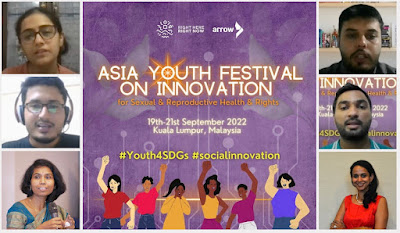Health
Youth Changemakers at the forefront of advocating for sexual health and rights
A regional initiative across countries in Asia is helping young people find innovative solutions to advance sexual and reproductive health and rights in their communities.
In Cox’s Bazaar, Bangladesh, a football player has put together a football team of vulnerable and marginalised children. Sport has transformative power, he says, adding that playing football will help channelise the children’s energies, address issues of aggression, and become a means of protecting them from abuse.
In Lahore, Pakistan, a theatre practitioner is using performing arts for social change.
In Uttarakhand, India, a young woman has set up a chatbot to help women and girls- who are forest dwellers- clarify myths and misconceptions around sexual and reproductive health. In the Philippines, a young woman is imparting online training to the community on the use of social media platforms to engage with the issue of rising adolescent pregnancies.
Supported by ARROW (The Asian-Pacific Resource and Research Centre for Women), these and other young leaders are finding solutions to the most pressing sexual and reproductive health and rights issues in their local contexts and communities. The premise is that those who bear the brunt of the consequence of climate change and unrealised sexual and reproductive health and rights are the ones who can best help find the most sustainable solutions to these problems.
Right Here Right Now
ARROW’s Right Here Right Now (RHRN) Changemakers initiative launched in 2020, has trained over 150 youth leaders from countries including India, Nepal, Bangladesh, Pakistan, Philippines, Indonesia, during the last two years. Over 40 innovative projects have been supported through mentorship and seed funding. Young people identified the problems in their local context and designed innovative solutions on a range of issues, including comprehensive sexuality education, sexual and gender-based violence, and LGBTIQAP+ rights of young people.
These youth changemakers are coming together at the Asia Youth Festival on Innovation for Sexual and Reproductive Health and Rights (SRHR), that is being held during 19-21 September 2022 in Kuala Lumpur, Malaysia, to celebrate their work in their communities and share the lessons learnt. The youth festival aims to help youth changemakers build their capacities on social entrepreneurship and SRHR through training, mentorship, pilots and scale-up initiatives. Sai Jyothirmai Racherla, Deputy Executive Director of ARROW, says that the Asia Youth Festival aims to foster a mindset of innovation and creative problem-solving among young people. “We hope to nurture building the youth movement for sustainable development in the Asia region,” she says.
Women and Earth initiative
The impact of climate change on sexual and reproductive health is increasingly becoming an area of interest for the youth. As communities grapple with the increased severity and frequency of floods and cyclones, there is a growing concern of its adverse impacts on women and girls. ARROW also implements the Women and Earth (WORTH) Initiative focused on climate change and SRHR, that is helping the youth develop new solutions to issues arising from interlinkages between gender equality and SRHR with environmental sustainability and climate change adaptation. Under this initiative young leaders from Bangladesh, Myanmar, Pakistan, and the Philippines have been supported to attend capacity building labs and develop and implement innovative ideas on SRHR and climate change.
The Asia Youth Festival celebrates the achievements of these changemakers and social change innovators and provides them an opportunity to share and learn from each other.
Sabir Ali, from Rural Development Foundation, Pakistan, works in the Sindh province which is prone to floods. It has also been impacted in the recent floods the country is facing. Sabir notes that there is greater risk of gender-based violence and sexual abuse in relief camps. As food relief and disaster relief become priority, access to family planning services get disrupted, he says. Sabir’s work focuses on helping women and girls engage with policy making. Through safe spaces and dialogue women and girls are able to articulate their problems. These could be as simple as lack of menstrual products during a disaster or as complex as increased sexual abuse and violence.
The Asia Pacific region hosts over 60% of the world’s young population. This translates into more than 750 million young women and men aged 15 to 24 years. Many adolescents and young people in the region continue to transition to adulthood with inadequate information on matters of sexual and reproductive health and rights. According to a UNFPA report on sexual and reproductive health and rights of young people in the Asia Pacific, 1 in 3 women aged 15-24 do not have their demand for family planning satisfied by modern methods; less than 1 in 4 sexually active unmarried adolescents are using a modern method of contraception. There are an estimated 3.6 million unsafe abortions every year among women aged 15-24 years. Maternal disorders are the leading cause of death of girls aged 15-19 years in the Pacific, and the second leading cause of death in South Asia.
Tanya Khera, 29, co-founder of the Samanta Foundation works in Uttarakhand, India, among forest dwellers. She says that issues and challenges peculiar to these communities include early marriage, adolescent pregnancies, and miscarriages. To address the challenge of lack of awareness on issues such as menstrual hygiene management, spacing of pregnancies, as well as resources and services available to them, Tanya has set up a chatbot on sexual health issues. The chatbot also refers users to the government’s app for tele-counselling or to the closest health facility. Users also have an option to call a trained young woman from the community for more advice.
According to Sivananthi Thanenthiran, Executive Director of ARROW, “Today young people are not passive recipients of social change, they are active and eager to use their skills and contribute to achieve sustainable development in the areas of environment, climate and economic development within communities to foster prosperity for people and the planet. We are seeing young people at the forefront of the SRHR movement, as leaders, programme implementers, social entrepreneurs, innovators, peer educators realising SRHR not only for themselves but for the communities.”
Although the initiatives are nascent and pilot in scope, they are demonstrating change. Tanya says, “Our trainings have helped women and girls understand their anatomy. Earlier, women would go to the doctor with their husbands and he would talk to the doctor about his wife’s ailment. But, because of this initiative, women are now able to speak for themselves.” She adds that young girls are quick to adapt and eager to learn. For example, the girls are using sanitary napkins and menstrual cups. They are far more confident about their bodies. Tanya’s initiative reaches about 300 women in Uttarakhand, India. She has trained 20 girls from the community who can help women and girls access the chatbot on sexual and reproductive health and rights and answer any questions. “Technology cannot work in silos,” Tanya says.
In Sindh, Pakistan, Sabir’s project has trained women to form groups called ‘Saheli’ (which means friend) of 20 women each. It has already reached out to 300 women.
“We train the women in these working groups, build their capacities and provide them with office space and resources like internet use,” Sabir says. These groups were successful in sensitising decision makers to ensure prevention of gender-based violence and sexual abuse in relief camps during the recent floods.
As youth changemakers come together at the upcoming festival, it will be interesting to see the sharing of ideas from across countries and learning from each other. As Sai rightly notes, “Normalising the conversations, and creative problem solving around SRHR information and services is the way to go forward. Young people are ready, it is now for the ecosystem around young people to be facilitative and enable them to translate their worth and capabilities into action at the ground level.”
Sumita Thapar – CNS (Citizen News Service)
(Sumita Thapar is CNS Special Correspondent and writing from 2022 Asia Youth Festival on Innovation for Sexual and Reproductive Health and Rights, Kuala Lumpur, Malaysia. She is a noted journalist and development communication expert. Follow her on Twitter: @SumitaT or read: w
Continue Reading


